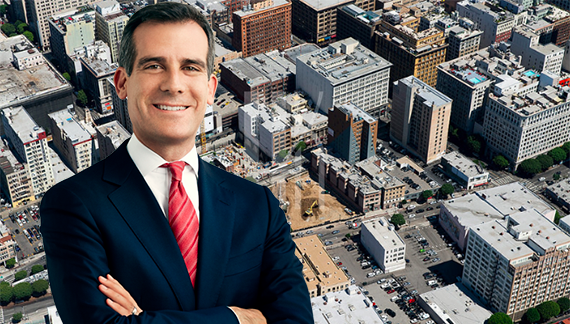Trending
Not a “ploy”: Garcetti bans off-record chats between developers and planning commissioners

Measure S may have been soundly defeated on Tuesday, but a directive signed by Mayor Eric Garcetti on Thursday morning addresses some of the key issues raised by the failed initiative’s backers.
In a wide-ranging executive directive, Garcetti banned ex-parte communications between developers and planning commissioners — a main concern of the measure’s supporters, who sought to reduce the behind-closed-doors deals they said impact project approvals.
“We will enhance public confidence in our planning process by ensuring that all discussions with Planning Commissioners regarding projects under their consideration are public discussions,” Garcetti wrote in the directive. “Planning Commissioners are volunteers who make critical decision as they represent our city’s diverse communities. Their proceedings must be fully transparent to maintain the public trust.”
An email sent Thursday to Yes on S spokeswoman Jill Stewart seeking reaction to Garcetti’s bounced back as undeliverable. However, in January, the group had hinted that it may have dropped its costly, often-ugly fight over Measure S if the mayor took steps to limit ex-parte communications. Garcetti had pledged to do so in September, but declined to take action during the campaign, leading Stewart to tell the Los Angeles Times in February the mayor’s announcement was a “ploy.”
The directive, officially titled Executive Directive 19, also takes steps to address another major concern of Measure S backers: the outdated general plan and community plans that govern development in Los Angeles. Critics argued the archaic documents have led to haphazard planning and so-called spot zoning, which they say has given rise to developments out of character with their host communities.
On Thursday, Garcetti ordered the Department of City Planning to accelerate the update of the general plan, creating a schedule and program for the process within 30 days and called for a periodic review process to occur every five years afterward.
The program will also include the review and possible updating of Los Angeles’s 35 community plans—the oldest which, covering Hollywood, dates back to 1988. The city council voted in February to create a new ordinance that mandates the community plans be updated every six years.
Garcetti also called for the city’s personnel department to prioritize hiring city planners to speed up the process.
The directive also covers a host of other planning, transportation, and housing items, including: expanding the city’s oversight of the environmental-impact-report process by requiring developers to hire environmental consultants that have been placed on a prequalified list, calling on the city council to pass an affordable housing linkage fee, establishing a Measure M steering to committee and establishing a mayoral task force on planning to ensure that plans for the future growth of the city are aligned with infrastructure improvements.
In a statement on Thursday, Councilmember David Ryu applauded the mayor’s directive to ban the ex-parte communications, and honed in on the need to regularly update the community plans.
However, Ryu said the directive was just one step in cleaning up the planning process targeted by Measure S backers.
“The City Council must also quickly pass comprehensive campaign finance reform, which will restore Angelenos’ faith in the City’s ability to fairly review and approve major development projects,” he said. “We need a campaign finance system that limits the influence of big-pocketed developers and instead, empowers thousands of small donors to have their voices heard.”




